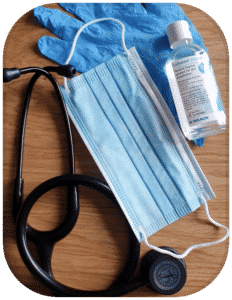Zoe Horseman is a Research Assistant at the University of Edinburgh and a Community Staff Nurse in NHS Lothian. Her piece, originally written for the University Nursing Studies blog, is a reflection on the COVID-19 pandemic and its effect on District Nursing.
 During the COVID-19 pandemic, while the majority of the country stayed home to save lives, District Nurses across the country continued to deliver care in people’s homes. This presented new challenges to the service and gave opportunities for improvement.
During the COVID-19 pandemic, while the majority of the country stayed home to save lives, District Nurses across the country continued to deliver care in people’s homes. This presented new challenges to the service and gave opportunities for improvement.
The COVID-19 pandemic highlighted just how essential the District Nursing service is to the safety and wellbeing of housebound and vulnerable patients. Many other community-based services withdrew from home visits and opted to work online or from a distance instead, equally many family and friends stopped visits to loved ones in order to protect and shield. This meant the District Nurse quickly became the only person that many patients would see in a day or even a week. This led to an increase in the demands placed on the District Nursing service, as our already isolated patients became even more insulated from the outside world than before. I found myself assisting with more personal care to ‘bridge the gap’ when carers weren’t available, tidying homes, unpacking shopping, feeding cats and dogs, and even posting the occasional letter for my patients when they asked! These additional but fundamental tasks, coupled with clinical care and social interaction, formed the basis of a person-centred care delivery in the midst of a global pandemic.
Looking to the future, there are lessons we can learn as a service from the COVID-19 pandemic, particularly around encouraging and facilitating self-management of care.
At the onset of COVID-19, my team received some phone calls from patients and their family members wishing to stop their District Nurse visits during the pandemic in favour of shielding more effectively and to alleviate pressure on the service. This led to the challenge of teaching and supporting self-management via telephone with patients who have not self-managed their own care before and who have fears and anxieties about doing so. We found this to be successful in most cases. We now use a phone call, where appropriate, in place of a home visit to prompt some diabetics to check their blood glucose level and administer insulin, and we make weekly calls instead of home visits to support those living at home with a life-limiting diagnosis. Many family members took on the challenge of re-dressing wounds at alternative visits, reducing the need for the nursing staff to attend. As a District Nurse, I felt so proud of my patients and their families for their efforts to self-care, especially when many of them lacked the confidence to do this prior to the COVID-19 pandemic. Looking to the future, there are lessons we can learn as a service from the COVID-19 pandemic, particularly around encouraging and facilitating self-management of care, and sign-posting individuals to more appropriate services.
We faced challenges around the provision and use of PPE, and the communication barriers associated with face masks. Equally, the introduction of social distancing measures meant that physical acts of kindness and comfort, such as a hug or holding a hand, were no longer appropriate, and we needed to draw on verbalising empathy and support instead. This was particularly challenging when providing care to those nearing the end of life, as together with patients and families we faced difficult decisions about final place of care and ways to facilitate seeing loved ones when the end was near. As a District Nursing team, we found ways to deliver person-centred care in the final days and weeks of life, whilst navigating the risks of COVID-19.
masks. Equally, the introduction of social distancing measures meant that physical acts of kindness and comfort, such as a hug or holding a hand, were no longer appropriate, and we needed to draw on verbalising empathy and support instead. This was particularly challenging when providing care to those nearing the end of life, as together with patients and families we faced difficult decisions about final place of care and ways to facilitate seeing loved ones when the end was near. As a District Nursing team, we found ways to deliver person-centred care in the final days and weeks of life, whilst navigating the risks of COVID-19.
The District Nursing service found new ways to provide the same high standard of care and support to our patients, despite the challenges presented during COVID-19. We need to learn from these new ways of working and adapt our practice in order to meet the needs of the individuals’ on our caseload in the future.